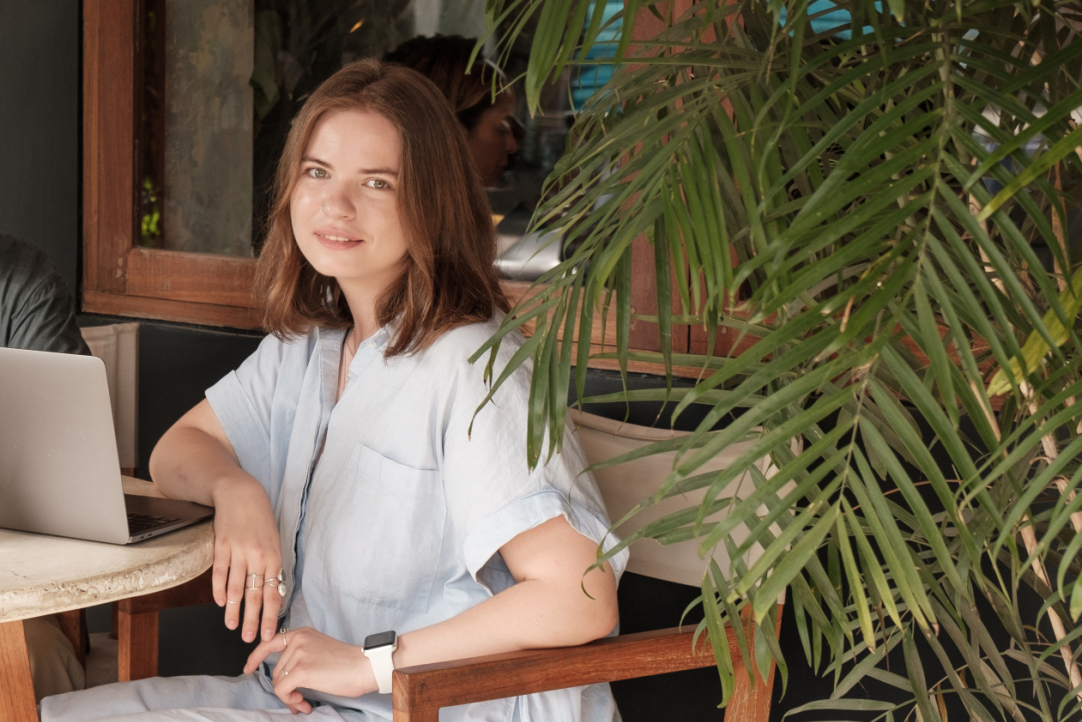'The Process of Creating a Text Is My Motivation'
Daria Krasnopevtseva is a 2018 graduate of the Master's programme 'Arts and Culture Management' who is currently working as an editor at the company Huntflow. In her interview, Daria talks about her interesting work at the recruitment automation company, the important elements of a great corporate culture, and her hipster hobbies.

— Where did you get your Bachelor's degree? Why did you decide to continue your education in the Master's programme 'Arts and Culture Management' at HSE University-St Petersburg?
— I finished the Bachelor's programme 'Advertising and Public Relations'. To be honest, enrolment in a Master's programme in Moscow or St Petersburg was a legitimate way to move out of my parents' place (smiles), but I also wanted to study. At that time, I stuck to the stereotype that a bachelor's degree is an incomplete higher education, which is why I had to apply for a master's degree. My university taught me English well, but I had to master advertising and PR myself by working at the same time for an event agency. I was looking for a master's programme that was connected to my professional activities as a creative copywriter and an event manager, so I applied to a Moscow campus for a programme 'Integrated Marketing Communications' and to HSE University-St Petersburg for the programme 'Experience Economy'. This programme was more relevant to me because one of the tracks was event tourism, and at the event agency, I worked on event concepts, wrote scripts, and, in general, did exactly that. In the end, I got a state-funded place in the programme 'Experience Economy' and moved to St Petersburg.
— Which courses impressed you during your studies? Did any of the lecturers influence you professionally?
— I remember Ksenia Kuzmina, the lecturer who delivered the course 'Non-profit Marketing' and a course on launching a start-up. She is a great person, taught classes interestingly, and always supported the theory with her practical experience and discussed practical cases. Even after graduation, I kept in touch with her.
— Did you engage in scientific activities during your master's studies? This stage of education seems to be aimed at academic knowledge, and master's students usually write articles or participate in scientific conferences. What was it like for you?
— It seems to me that our programme was primarily practice-oriented. We were trained as executives and organisers in the spheres of cultural and event tourism. We were implementing projects that were closely related to practical activities and I actively participated in them.
— Let's talk about your current professional activities. What is your position at Huntflow and what are your duties?
— Huntflow is an IT company that develops software for recruiters. Our editorial office promotes the company's blog, where we talk about finding, selecting and managing personnel, as our clients are HR managers and recruiters. Of course, we as editors are experts in recruitment, but there are other tasks set for us: we generate traffic at the top of the sales funnel, establish the first contact with people in such a way that they can become potential customers of our products and know our brand.
— Which work tasks do you enjoy the most? Which ones annoy you?
— The most boring is working with interview transcripts. You have to read about 30 pages of raw material. My task is to break through everything that was said and get to the very essence of it, the main facts, and then, based on them, write an in-depth and catchy text. What I love the most is generating ideas. Every month, our team has a phone meeting where we discuss the topic of texts for the next month. Generating ideas before the meeting and then polishing them together during it are the most pleasant parts of my work.
— Tell us a little about the inner workings of Huntflow. What corporate privileges do employees have? What can entice job seekers to join Huntflow?
— Fun fact: I found my job at Huntflow via Twitter. It actually says a lot about the corporate culture: we have a great team of like-minded people who are united by the desire to create an amazing product. I like that we have a certain chain of command and understanding of 'employee-executive' relations, but we can easily joke with our general director, follow each other on Twitter, share memes and exchange music. We have the same opinion on socially significant topics, which is why there is always something interesting in our work chat. For historical reasons, such an atmosphere is created by the company's founders, both of whom are 'conditional hipsters': one is a software developer, another is a designer. Huntflow also supports charity: this year, we have launched a charity project. Now we transfer 3% of profits to organisations which help adults with developmental disabilities and specific health conditions find working places. I am very happy to be a part of a company whose goals are not limited to making profit. And of course, Huntflow offers standard 'incentives' such as a social package, voluntary health insurance, and a MacBook for work. But for me, all of that is secondary.
— What do you see your future career development like? Do you have any ambitious goals?
— I'm still trying to answer the question of whether I want horizontal or vertical growth, as I am not sure that I can become a good manager. A concept that really speaks to me now is that of a 'T-shaped' specialist—someone who is well-versed in many fields and an expert in one of them. My expertise lies in writing texts, but I would like to develop skills in HTML layout and design.
— What three words do you associate with HSE University-St Petersburg?
— Experience, responsibility and freedom.
Text by Evgeniy Bol'nyh, 2nd-year student of the Master's programme 'Arts and Culture Management'

